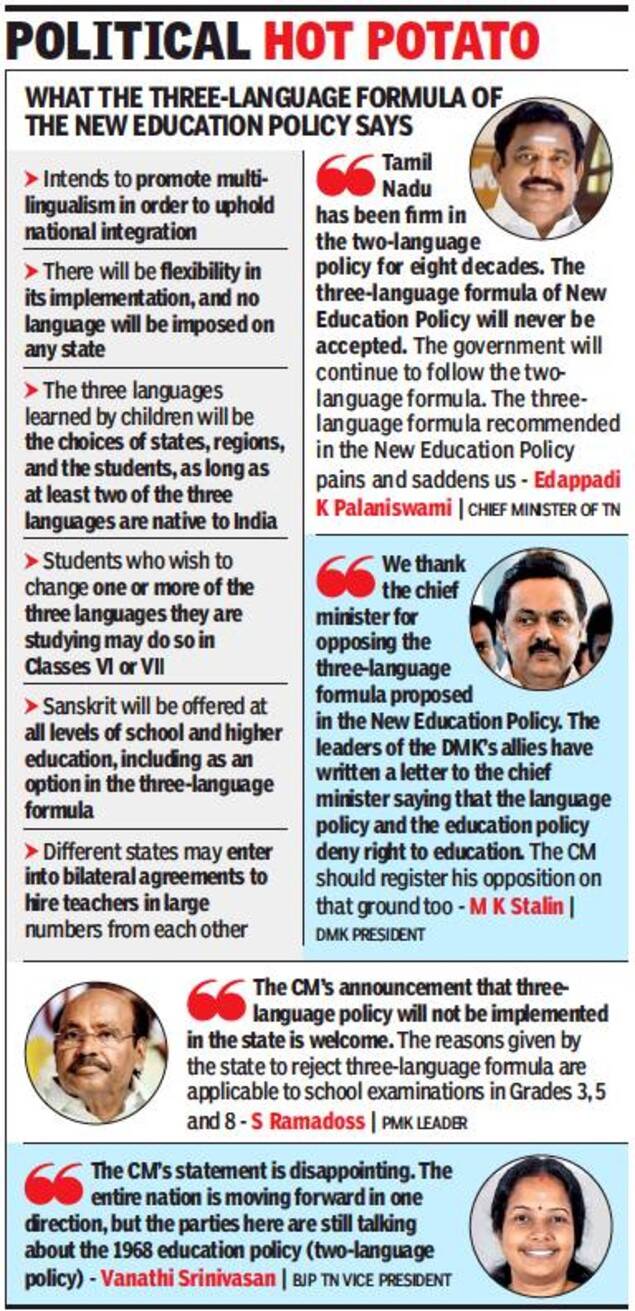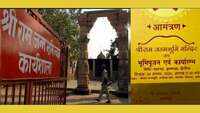
CHENNAI: On January 23, 1968, as the anti-Hindi agitations raged across Tamil Nadu, the C N Annadurai-led DMK government sat for a second meeting of the second session of the legislative assembly. Education and industries minister V R Nedunchezhiyan moved a resolution in the House, in the wake of the ‘serious situation’ triggered by the Union government’s Official Languages (Amendment) Act, 1967. The House resolved “that the three-language formula shall be scrapped, and that Tamil and English alone shall be taught, and Hindi shall be eliminated altogether from the curriculum in all the schools in Tamil Nadu”.
Five decades later, political parties in the state, including the DMK and the AIADMK, have come together to oppose the three-language formula promoted by the Narendra Modi government’s New Education Policy (NEP). Chief minister Edappadi K Palaniswami on Monday urged the PM to reconsider it. “It will never be allowed in Tamil Nadu. The people of the state have been firm in the two-language policy for eight decades,” he said. DMK chief M K Stalin was quick to thank the CM on Twitter for his stand.

Under the heading ‘multilingualism, and power of language’, a segment in the NEP says that wherever possible, the medium of instruction until at least Grade 5, but preferably till Grade 8 and beyond, will be the home language/mother-tongue/local language/regional language.
The three-language policy leaves it to states to decide on what that language would be, but parties see it as a tacit attempt by the Centre to impose Hindi. In a letter to the CM earlier in the day, the DMK and its allies lashed out at the NEP, terming it “saffronisation and commercialisation of education, giving importance to Sanskrit-Hindi, and going against the principles of federalism, social justice, women rights, equality and diversity.”
The BJP in the state stands isolated on the issue. Senior BJP leader, H V Hande said, “NEP is a landmark policy which gives a lot of freedom to the states. There is no compulsion to implement a three-language formula.”
Incidentally, Hande, a former legislator of C Rajagopalachari’s Swatantra Party, had been present in the assembly and supported the DMK’s 1968 resolution against “Hindi imposition by the Congress”. Rajaji supported Annadurai’s two-language formula and fought the assembly elections together the previous year, throwing out M Bhaktavatsalam-led Congress regime.
Today, the Congress joins the opposition in rejecting the three-language formula. “The TNCC welcomes the two-language policy. Our view is that Hindi should not be imposed. Nehru assured that English will continue to remain as long as non-Hindi speakers desire it. The Congress will not oppose anyone, who wants to learn any language, but will not accept the imposition of Hindi,” TNCC president K S Alagiri said. The parties see NEP as the Modi government’s attempt to impose Sanskrit.
Five decades later, political parties in the state, including the DMK and the AIADMK, have come together to oppose the three-language formula promoted by the Narendra Modi government’s New Education Policy (NEP). Chief minister Edappadi K Palaniswami on Monday urged the PM to reconsider it. “It will never be allowed in Tamil Nadu. The people of the state have been firm in the two-language policy for eight decades,” he said. DMK chief M K Stalin was quick to thank the CM on Twitter for his stand.

Under the heading ‘multilingualism, and power of language’, a segment in the NEP says that wherever possible, the medium of instruction until at least Grade 5, but preferably till Grade 8 and beyond, will be the home language/mother-tongue/local language/regional language.
The three-language policy leaves it to states to decide on what that language would be, but parties see it as a tacit attempt by the Centre to impose Hindi. In a letter to the CM earlier in the day, the DMK and its allies lashed out at the NEP, terming it “saffronisation and commercialisation of education, giving importance to Sanskrit-Hindi, and going against the principles of federalism, social justice, women rights, equality and diversity.”
The BJP in the state stands isolated on the issue. Senior BJP leader, H V Hande said, “NEP is a landmark policy which gives a lot of freedom to the states. There is no compulsion to implement a three-language formula.”
Incidentally, Hande, a former legislator of C Rajagopalachari’s Swatantra Party, had been present in the assembly and supported the DMK’s 1968 resolution against “Hindi imposition by the Congress”. Rajaji supported Annadurai’s two-language formula and fought the assembly elections together the previous year, throwing out M Bhaktavatsalam-led Congress regime.
Today, the Congress joins the opposition in rejecting the three-language formula. “The TNCC welcomes the two-language policy. Our view is that Hindi should not be imposed. Nehru assured that English will continue to remain as long as non-Hindi speakers desire it. The Congress will not oppose anyone, who wants to learn any language, but will not accept the imposition of Hindi,” TNCC president K S Alagiri said. The parties see NEP as the Modi government’s attempt to impose Sanskrit.

Coronavirus outbreak
Trending Topics
LATEST VIDEOS
City
 'Wanted to teach Hindus a lesson' using political power, ex-AAP councillor Tahir Hussain confesses
'Wanted to teach Hindus a lesson' using political power, ex-AAP councillor Tahir Hussain confesses  48-hour countdown to Ram Mandir Bhumi Pujan in Ayodhya; invitation cards sent
48-hour countdown to Ram Mandir Bhumi Pujan in Ayodhya; invitation cards sent  UP CM Yogi Adityanath takes stock of preparations in Ayodhya ahead of Ram Temple bhumi pujan ceremony
UP CM Yogi Adityanath takes stock of preparations in Ayodhya ahead of Ram Temple bhumi pujan ceremony  J&K: Army Jawan abducted from Kulgam, vehicle set ablaze; massive search operation launched
J&K: Army Jawan abducted from Kulgam, vehicle set ablaze; massive search operation launched
More from TOI
Navbharat Times
Featured Today in Travel
Get the app





